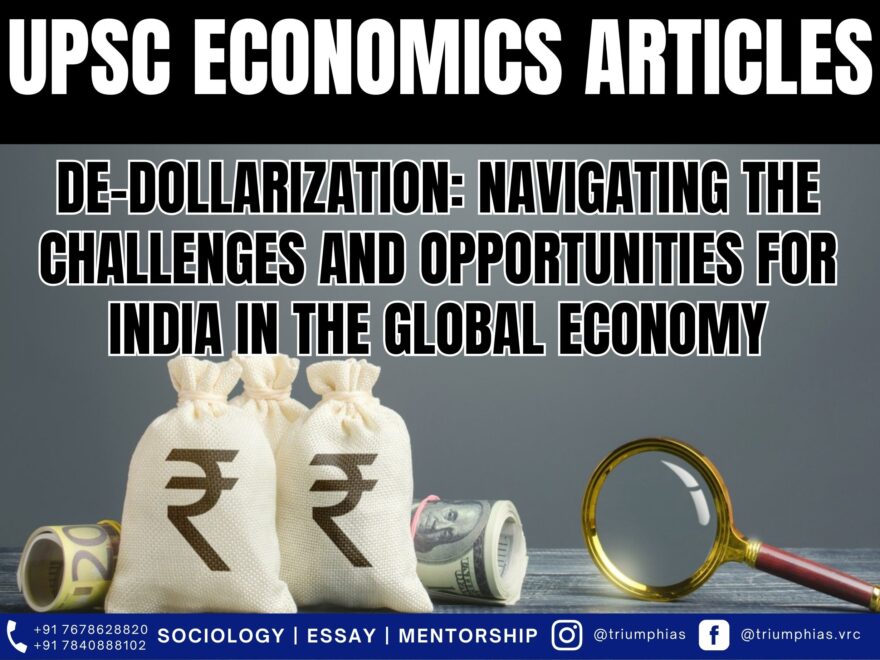De-dollarization
(Relevant for Economics Section of General Studies Paper Prelims/Mains)

De-dollarization
De-dollarization entails the diminishing influence of the US dollar in international financial dealings. This movement towards de-dollarization has become increasingly apparent in recent times, as numerous nations are broadening the range of currencies they hold in reserve and lessening their reliance on the US dollar.
Underlying factors driving this trend
- Geopolitical tensions: The escalating tensions between the United States and other nations, particularly China and Russia, have prompted a shift in their economic strategies aimed at diminishing their reliance on the US dollar. For instance, US sanctions against its adversaries create trade obstacles.
- US economic policies: The US Federal Reserve’s implementation of monetary tightening measures has resulted in a capital influx into the USA, potentially reducing foreign investments in other countries, thereby impacting economic growth.
- Risk of Financial Crisis: The prevalence of the dollar in global trade amplifies the risk of a worldwide financial crisis, as a crisis within the US economy can trigger repercussions in the global economic landscape.
- Emerging economies: Numerous emerging economies, including India, China, and Russia, have been channeling investments into their domestic economies, fostering a shift towards local currencies and diminishing reliance on the US dollar.
- Growing use of alternative currencies: The emergence of alternative currencies like the euro, yen, and yuan has provided viable options to the US dollar in international transactions.
- However, de-dollarization presents several challenges for countries due to the enduring dominance of the US dollar in the international financial system. Some of these challenges encompass:
- Non-fully convertible national currencies: National currencies still lack full convertibility, indicating that despite alternative trading systems and multiple currency circulation mechanisms, the US dollar maintains its dominance. For example, Russia recently suspended rupee trade settlement with India for the same reason.
- Currency fluctuations: National currencies may experience fluctuations in value relative to the dollar, making it challenging for countries to formulate stable economic policies and for businesses to engage in long-term investments.
- Limited usage of national currencies in global trade: The dollar continues to be extensively used in international trade, making it strenuous for national currencies to compete. This can hinder countries’ ability to engage in international trade and businesses’ expansion on a global scale.
- Dependence on the dollar: Many nations heavily rely on the dollar for trade and financial transactions, rendering them vulnerable to fluctuations in the dollar’s value and the policies of the US government.
- Financial instability: The dollar’s supremacy within the international financial system can contribute to financial instability in other countries, as they may become more susceptible to financial crises.
To address the challenges posed by it, India can take the following measures
- Diversify foreign exchange reserves: India has the option to diversify its foreign exchange reserves by allocating investments to other currencies like the euro, yen, and yuan. This strategic move can curtail its reliance on the US dollar.
- Promote international trade in local currencies: India can actively encourage international trade conducted in local currencies, such as the Indian rupee. This approach has the potential to diminish the necessity for US dollars in global transactions. India’s endeavors to settle trade in rupees with its trade partners align with this objective.
- Develop domestic markets: India possesses the capability to cultivate its domestic markets, with a particular emphasis on nurturing the bond market. Such efforts can attract foreign investors and mitigate India’s reliance on external capital.
- Enhance economic connections with other nations: India has the opportunity to fortify its economic relationships with other nations, especially those actively reducing their dependency on the US dollar, including China and Russia. This approach can unlock fresh prospects for trade and investment.
The de-dollarization trend in the global economy presents both challenges and opportunities for India. By diversifying its foreign exchange reserves, promoting international trade in local currencies, developing its domestic markets, and strengthening economic ties with other countries, India can address the challenges posed by de-dollarisation and take advantage of the opportunities it presents.
Sample Question for UPSC Sociology Optional Paper:
- Question: What are the geopolitical factors driving the trend of de-dollarization?
Answer:
Geopolitical tensions between the United States and other nations like China and Russia are promoting a shift towards diminishing reliance on the US dollar.
- Question: How does the US Federal Reserve’s monetary policy influence de-dollarization trends?
Answer:
Monetary tightening measures by the US Federal Reserve can attract capital into the USA, potentially reducing foreign investments in other countries and promoting de-dollarization.
- Question: What challenges do emerging economies like India face in the wake of de-dollarization?
Answer:
Challenges include currency fluctuations, limited usage of national currencies in global trade, and financial instability due to the enduring dominance of the US dollar.
- Question: How can India diversify its foreign exchange reserves to adapt to de-dollarization?
Answer:
India can allocate investments to other currencies like the euro, yen, and yuan to curtail its reliance on the US dollar.
- Question: What is the role of domestic markets in mitigating the challenges posed by de-dollarization?
Answer:
Developing domestic markets, especially bond markets, can attract foreign investors and mitigate India’s reliance on external capital.
Related Blogs …
 |
 |
To master these intricacies and fare well in the Sociology Optional Syllabus, aspiring sociologists might benefit from guidance by the Best Sociology Optional Teacher and participation in the Best Sociology Optional Coaching. These avenues provide comprehensive assistance, ensuring a solid understanding of sociology’s diverse methodologies and techniques.
De-dollarization, Global Economy, India, US Dollar, Geopolitical Tensions, Financial Crisis, Emerging Economies, US Economic Policies, Currency Fluctuations, Foreign Exchange Reserves, Domestic Markets, Trade Policy, De-dollarization, Global Economy, India, US Dollar, Geopolitical Tensions, Financial Crisis, Emerging Economies

Choose The Best Sociology Optional Teacher for IAS Preparation?
At the beginning of the journey for Civil Services Examination preparation, many students face a pivotal decision – selecting their optional subject. Questions such as “which optional subject is the best?” and “which optional subject is the most scoring?” frequently come to mind. Choosing the right optional subject, like choosing the best sociology optional teacher, is a subjective yet vital step that requires a thoughtful decision based on facts. A misstep in this crucial decision can indeed prove disastrous.
Ever since the exam pattern was revamped in 2013, the UPSC has eliminated the need for a second optional subject. Now, candidates have to choose only one optional subject for the UPSC Mains, which has two papers of 250 marks each. One of the compelling choices for many has been the sociology optional. However, it’s strongly advised to decide on your optional subject for mains well ahead of time to get sufficient time to complete the syllabus. After all, most students score similarly in General Studies Papers; it’s the score in the optional subject & essay that contributes significantly to the final selection.
“A sound strategy does not rely solely on the popular
Opinion of toppers or famous YouTubers cum teachers.”
It requires understanding one’s ability, interest, and the relevance of the subject, not just for the exam but also for life in general. Hence, when selecting the best sociology teacher, one must consider the usefulness of sociology optional coaching in General Studies, Essay, and Personality Test.
The choice of the optional subject should be based on objective criteria, such as the nature, scope, and size of the syllabus, uniformity and stability in the question pattern, relevance of the syllabic content in daily life in society, and the availability of study material and guidance. For example, choosing the best sociology optional coaching can ensure access to top-quality study materials and experienced teachers. Always remember, the approach of the UPSC optional subject differs from your academic studies of subjects. Therefore, before settling for sociology optional, you need to analyze the syllabus, previous years’ pattern, subject requirements (be it ideal, visionary, numerical, conceptual theoretical), and your comfort level with the subject.
This decision marks a critical point in your UPSC – CSE journey, potentially determining your success in a career in IAS/Civil Services. Therefore, it’s crucial to choose wisely, whether it’s the optional subject or the best sociology optional teacher. Always base your decision on accurate facts, and never let your emotional biases guide your choices. After all, the search for the best sociology optional coaching is about finding the perfect fit for your unique academic needs and aspirations.
To master these intricacies and fare well in the Sociology Optional Syllabus, aspiring sociologists might benefit from guidance by the Best Sociology Optional Teacher and participation in the Best Sociology Optional Coaching. These avenues provide comprehensive assistance, ensuring a solid understanding of sociology’s diverse methodologies and techniques. Sociology, Social theory, Best Sociology Optional Teacher, Best Sociology Optional Coaching, Sociology Optional Syllabus.
Best Sociology Optional Teacher, Sociology Syllabus, Sociology Optional, Sociology Optional Coaching, Best Sociology Optional Coaching, Best Sociology Teacher, Sociology Course, Sociology Teacher, Sociology Foundation, Sociology Foundation Course, Sociology Optional UPSC, Sociology for IAS,
Follow us :
🔎 https://www.instagram.com/triumphias
🔎https://www.youtube.com/c/TriumphIAS
https://t.me/VikashRanjanSociology
Find More Blogs
|
Scope of the subject and comparison with other social sciences |
|||
|
|
|
|
Modernity and social changes in Europe |

